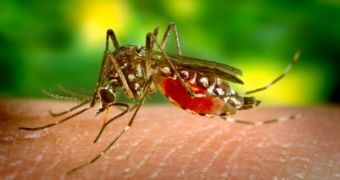Juvenile hormones are just like the hormones of teenagers – they help make the passage to adult life, except they play this important role in insects, like fruit flies, butterflies and mosquitoes.
They are part of a group of insect isoprenoids, that transform the body structures of insects, as they molt from larva to pupa and then adults, but unlike in humans, the juvenile hormone inhibits development of adult characteristics until the insects reach the optimum stage.
These hormones are also in charge of the reproductive maturation in adult insects, and scientists have already taken this opportunity to use synthetic juvenile hormone mimics as pesticides against mosquitoes.
In a recent research, Virginia Tech scientists have found an important phase in the activation of juvenile hormone target genes – a protein partner for Met in the yellow fever mosquito Aedes aegypti.
This protein is called FISC and along with Met, it forms a complex in the presence of the juvenile hormone.
Binding the two proteins to the regulatory regions of some juvenile hormone target genes, is closely linked to the expression levels of those target genes in the young adult mosquitoes.
Reducing the protein levels of either of the two by using genetic approaches leads to a weakening of the expression of the juvenile hormone target genes, and reduces the egg production once the female mosquitoes has taken a blood meal.
The leader of the research group was Jinsong Zhu, assistant professor of biochemistry with the Fralin Life Science Institute at Virginia Tech, and their study clearly proves that formation of Met-FISC complex is a very important step in juvenile hormone signaling pathway.
Zhu said that “understanding the molecular details in the juvenile hormone signaling may lead to discovery of novel chemicals that target mosquitoes with more selectivity.
“The secretion of juvenile hormone is drastically reduced in the final larval stage, as a result of which the larva is transformed into a pupa.
“While an insect protein, Methoprene-tolerant (Met), has been postulated as the top candidate for juvenile hormone receptor, it remains unclear how this protein is activated by juvenile hormone,” added Zhu.
Basically, the team believe that studying the hormone-regulated reproduction will offer better possibilities of revealing the molecular action of juvenile hormones.
Zhu is currently working with Professor David Bevan's group in the biochemistry department to analyze the structure-function relationship of the Met protein.
The research is presented in the early online edition of the Proceedings of the National Academy of Sciences.

 14 DAY TRIAL //
14 DAY TRIAL //